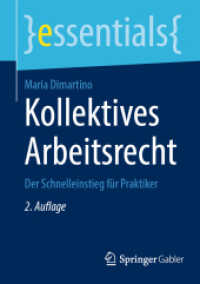Full Description
This is a groundbreaking and interdisciplinary handbook, which places the social sciences and the humanities at the centre of intellectual and deliberative efforts about policy, law, public management, knowledge, health aesthetics and feminism. Presented in three volumes, the handbook is ahead of its time and sets out the terms for the post-colonial discourse on agency, freedom and justice. Its main objective is to spark a conversation among citizens on the challenges facing the country, such as poverty, inequality and unemployment. The contributors have a deep understanding of the social, economic and political aspects of post-colonial life in South Africa and the demands for fundamental change. This understanding is the source of their concern for and reflections on complex systems of agency, freedom and justice. The social sciences and the humanities stand to benefit immensely from these reflections, not as they are filtered through the lenses of theory and ideology in the abstract, but as we encounter them in lived experience.
Contents
Foreword
Preface: Agency, Freedom and Justice
Acknowledgements
Abbreviations
Introduction: The Deliberative Framework
PART 1: POLICY AND LAW
Chapter 1. Is the Law Doing Enough? Recent Legislative Reforms to Combat Gender-Based Violence
Chapter 2. Why Land Restitution Has Failed and What Can be Done about It
Chapter 3. South Africa's Broken Policy Design: Quo Vadis?
Chapter 4. An Analysis of the Role of Law and Policy in Eradicating the Legacies of Colonialism and Apartheid
Chapter 5. Towards a Post-colonial Feminist Perspective for Understanding Rural Women's Land Rights in South Africa in a Context of a Disjuncture between Policy and Practice
PART 2: ECONOMY
Chapter 6. Examining the South African Social and Economic Landscape through a Statistical Lens
Chapter 7. To Fix South Africa, Fix Its Framing: Declinism as a Behavioural Bias and Failed Strategy for Solving Systemic Challenges
Chapter 8. Social Justice and the City: Invisible Boundaries and the Hidden Hand of Social Dispossession in the Post-apartheid Transition
Chapter 9. Shaking off the Burden of the Past: Rethinking Poverty and Inequality
Chapter 10. The Role of Companies in Solving Deep-Rooted Societal Problems
Chapter 11. Towards a South African Economy that 'Belongs to All Who Live in It'
Chapter 12. The Case for Alternative Economic Approaches to Development and Human Well-Being in South Africa
Chapter 13. South Africa and the Developmental State Model: Lessons from the Asian Historical Experience
Chapter 14. Breaking the Vicious Circle of the Divide-Rule-Extract Strategy
Chapter 15. A Supply-Driven Approach to Alleviate Poverty, Unemployment and Inequalities in Black Areas through Entrepreneurship
PART 3: PUBLIC MANAGEMENT AND POLITICS
Chapter 16. Freedom, Social Justice and Leadership
Chapter 17. Towards a Competent and Ethical Public Service
Chapter 18. The Governability of Liberal Democracy in Post-apartheid South Africa: Constraints
Chapter 19. A Professional Public Service is Sine Qua Non for a Democratic South Africa
Chapter 20. Building Co-operative Planning and Implementation Synergies as a Means to Inclusive Development
Chapter 21. Appropriate Measures to Improve the Delivery of Public Goods
Chapter 22. The Role of Municipal Councillors in the Implementation of Local Economic Development for Job Creation and Employment
PART 4: INTERNATIONAL RELATIONS AND DIPLOMACY
Chapter 23. Revisiting Kwame Nkrumah 60 Years Later
Chapter 24. Immigration between Post-apartheid South Africa and Nigeria: Prospects and Challenges
Chapter 25. The Legacy of Samora Machel: 36 Years after His Death
Chapter 26. African Lingua Francas: Language and Culture as Instruments for Regional Integration - the Example of Swahili
Chapter 27. South Africa and the Development of African Regionalism
28. Beyers Naudé, Jean-Paul Sartre and the Rebirth of a Non-racial, Just and Prosperous South Africa
Notes on Contributors







